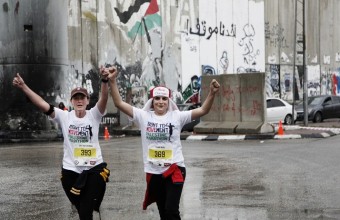Press Release
UN Resident Coordinator, James W. Rawley on behalf of the United Nations in the State of Palestine…27 March 2015, Jerusalem – Today, thousands of runners, are expected to participate in the Palestine Marathon in Bethlehem and, in doing so, draw attention to the right to freedom of movement.
Freedom of movement is a universal human right. Article 13 of the Universal Declaration of Human Rights says that everyone should be able to move around and reside anywhere within their country. Running a marathon is a simple manifestation of this right by each participant.
Running a marathon in Bethlehem highlights how freedom of movement of Palestinian women, men, girls and boys continues to be severely restricted under Israel’s prolonged military occupation. Marathon runners often ‘hit a wall’ under the physical and emotional strain of the 42-kilometre course. But in the occupied Palestinian territory (oPt) you literally hit the Wall well before that distance.
The Wall, or Barrier, and military checkpoints in the West Bank are obstacles to free movement and have a devastating impact on Palestinians’ lives, as the International Court of Justice has made clear. The blockade of Gaza similarly restricts the free movement of people and goods, stifling recovery and economic development, and dividing families and communities. Israel’s legitimate security requirements need to be balanced with respect for human rights. Recent Israeli measures to ease some of its restrictions on the movement of people and goods in the oPt are welcome. Further initiatives are to be encouraged, including a full lifting of the blockade.
Freedom of movement is also key to the enjoyment of other rights. Restrictions on freedom of movement restrict Palestinians’ enjoyment of many of their other human rights, including the rights to health, leisure and recreation, the right to an adequate standard of living and to work, and the right to education. Physical barriers also prevent young people from acquiring and exchanging knowledge, skills, culture and experience that would allow them to contribute fully to future Palestinian development.
The denial of free movement is a feature of gender inequality in Palestinian society and hinders efforts to ensure respect for the rights of women. Restrictions on movement in the oPt also adversely impact persons with disabilities, who already face barriers to the full enjoyment of human rights.
Freedom of movement is something to be cherished and protected. According to the Palestinian saying, (الحركة بركة) or al-haraki baraki: movement is a blessing. The participation of people from all walks of life, among them UN staff, from all parts of oPt in the Palestine Marathon, shows just how much they value their rights.
Let’s move together!’

